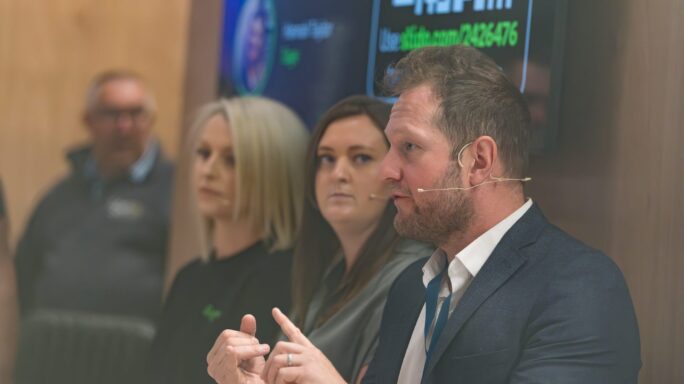How artificial intelligence helps accountants meet client demands
Artificial intelligence and client management are concerns for accountancy practices. Accountant Alison Parsons explains how to create the Practice of Now.

Accountants are broadly looking forward to a future where artificial intelligence (AI) augments their workload, with the majority – 66% – saying they would invest in AI if it automated time-consuming and repetitive tasks.
That’s according to independent research carried out for Sage’s Practice of Now 2018 report, which includes a survey of more than 3,000 accountants worldwide.
Managing client demands and offering support remain key roles for accountants, even more so now. In the same report, 83% of accountants said clients expect more of them than two years ago, with 42% of clients expecting their accountant to provide business advice.
Life on the ground
It’s clearly a challenging landscape for practices old and new, and to get a view of how these challenges will be met in everyday accountancy work, we spoke to Alison Parsons of Albert Goodman LLP, a practice based in the south west of England with just under 300 staff and founded in 1866.
Alison worked as an Accounts Supervisor in industry for more than 17 years before qualifying as a Certified Accountant with Albert Goodman in 2011.
A high number (83%) of accountants say clients expect more of them than five years ago. Why do you think this is?
I think clients do require a lot more from their accountant than they used to. They’re taking care of more of the basic preparation tasks themselves using technology and consequently they’re looking for more proactive and forward-looking advice from us than they ever did before.
So if clients expect more, what should accountants be doing?
I think it’s really important that accountants keep reviewing the software they’re using and the tools that they employ, embracing those new developments which lead to increased efficiencies and the ability to offer better value for the client.
Standing still is not an option and those practices who feel they don’t need to re-evaluate their internal systems or services to clients are likely to be left behind.
42% of clients expect their accountant to provide business advice. What would you say to an accountant who is aiming to perfect and improve this aspect of their service offerings?
I think with my practice in particular, we do find that a lot of clients are looking for business advice and that tends to go hand in hand with the use of cloud or cloud-connected software with linked bank feeds, where financial information is much more current.
It gives us the capability to look forward and help our clients make business decisions based on really sound factual evidence – whether that’s buying a van, expanding the firm or perhaps taking on a new employee.
We can assess whether the business is growing and what cash flow looks like and really provide informed and valuable advice.
The majority of accountants say competition is stronger but that revenue is up. Why do you think this is?
I think the market generally for accountants is much more competitive than it was. I think it’s no longer enough to sit back, just do compliance work and not contact the client all year.
On the whole, clients are looking for more from their relationship with their accountant, so we aim to contact them more often and have something proactive, relevant and valuable to say during those conversations – really getting to know the client’s business in more depth and working hard to understand their aims.
This often leads to conversations about other services we can offer, which works very well for both parties.
Two thirds of accountants say they will turn to artificial intelligence for automation. How do you see this starting to impact the industry?
I think AI has a significant role to play in helping businesses become more efficient in their processes. We are using several of those products, particularly in our outsourcing departments. Using these tools to input information efficiently into the client software frees up time to analyse the data, looking for trends and patterns which the client may not have noticed, then providing valuable insight to the client.
Without the need to spend so long on data entry, there is more time for client contact and more opportunity to build the relationship and make a positive difference. This can also have a positive impact on staff morale, as individuals can see the opportunity to build their experience of business, rather than just crunching numbers with no client contact.
How artificial intelligence will impact accountants
While a natural reaction to research within the Practice of Now 2018 might be one of concern, the reality is that none of what’s coming in the future is anything new for the average accountancy practice. Accountancy has evolved alongside technology for perhaps the past 50 years.
Artificial intelligence is very likely already part of the software you use. For example, have you ever noticed how the Microsoft Outlook email client knows who you want to email when you start to type their name in the TO: field?
You might start typing DAVID but somehow it knows you mean your colleague DAVID SMITH and not the 100 other Davids who you might have emailed in the past. This is because the software has learned David Smith is somebody you email frequently, or it’s learned he’s part of your organisation so is more likely to be an email correspondent.
Make no mistake, this is a simple trick for software to perform but it indicates the shape artificial intelligence is likely to take over coming years.
While our sci-fi-fuelled imagination suggests our computer will talk to us with a sassy attitude and offer to take that annoying client receipt inputting off our hands, the reality is that, in the short term, AI will appear in software in small yet useful ways that just help get job the done. If it’s working correctly we won’t even notice it’s there.
Everyday AI
An oft-cited example in the accountancy profession is bank reconciliation and this is a feature that’s already present in some accountancy software packages. The AI learns to match common bank transactions against codes. It’s not perfect and some human effort is still required but the time saved can be substantial.
Here’s another example: your practice management software might learn about how seasonality affects your practice, so might suggest different staff or resource management policies depending on the time of year.
A good plan for any accountant is to keep an eye reports from your trade organisation to learn how AI will be implemented and to keep abreast of sites such as Sage Advice, where we regularly report on artificial intelligence issues and how it impacts business.





